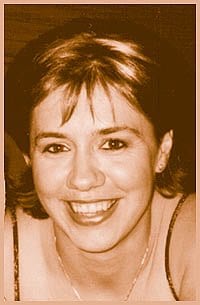Team Canada star Nancy Drolet, known for her Midas touch around the net, recently became known as country’s first prominent female athlete to come out, and she believes that will be good for women’s hockey.
Drolet, 29, a six-time world champion and Olympic silver medalist, “married” her long-time partner Nathalie Allaire in a civil union ceremony at the couple’s cottage in the Laurentians in Quebec in August. Drolet says it was a private affair for family and friends, but when a reporter from a local weekly newspaper showed up, she talked.
“He acted like it was the scoop of the century, but I’ve always been open and honest about my relationship with my family and friends,” says Drolet, who is Team Canada’s third all-time leading scorer but was a curious last-minute scratch from the 2002 Olympic roster. “But this gave me an opportunity to clarify some false impressions.”
Rumours of lesbian affairs and cover-ups on Team Canada flew after Drolet was cut, as they did in 1998, when star Angela James was dropped from the roster just weeks before the Nagano Olympics. In both cases, Drolet says the changes were about team performance rather than players’ or coaches’ personal lives.
Drolet scored overtime game-winning goals in the 1997 and 2000 world championships and led Team Canada in scoring in 2001, but her offensive production dropped in 2002. She says she holds no grudges and is gunning to make the team for the 2006 Olympics.
“Reporters often grab the first story they hear, but people have learned a lot more about women’s hockey. This gives me a chance to clear up the issue. It’s a minority of women in hockey [who are lesbians]. There’s a respect [on Team Canada] for everyone and their private lives and how they want to live.”
She captains the Vancouver Griffins of the National Women’s Hockey League, the premier women’s league in the world, which Drolet believes will become professional before the next Olympics.
“I have two goals in life,” she says, “advancing the cause of women’s hockey and winning a gold medal.”
She says her summer union to Allaire, who helps run Drolet’s women’s hockey school in her hometown of Drummondville, Quebec, helped rejuvenate her emotionally. “I could not be happier. In any relationship but especially as an athlete, you want to have that security. Your partner makes a lot of sacrifices, especially in an Olympic year. You’re doing this together. We wanted the responsibility. We want to have kids, somehow, one day. And she’s really an amazing person.”
Quebec’s civil union law, passed in June 2002, gives gay and lesbian couples in that province many of the same rights and responsibilities as married couples.
According to Drolet’s agent Bernard Hogue, reaction to the union has been positive.
“I don’t know about the rest of Canada, but in Quebec, people are really admiring her. They are saying, ‘Wow, you’re doing what you want and going for it. You’re doing things honestly and sincerely.'”

 Why you can trust Xtra
Why you can trust Xtra


